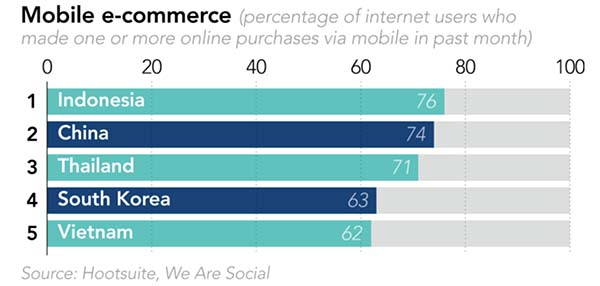[Analytics] Indonesia: the new tiger of Southeast Asia

Image by: fairobserver.com. Sketched by the Pan Pacific Agency.
In the second half of the last century, Hong Kong, Singapore, South Korea and Taiwan became known as Asia’s “tiger” economies as rapid industrialization, trade, and development of finance led to high rates of sustained growth. Today the first two countries are world-leading financial hubs and the second two are known for their state of the art manufacturing industries. Elad Natanson specially for the Forbes.
A similar transformation is occurring in Southeast Asia, only now the forefront of change is being driven by the mobile economy. Nowhere is this more evident than in Indonesia, the fourth largest country in the world by population. That’s right – Indonesia is home to over 265 million people. Here are some other amazing facts about Indonesia:
- It’s a young country. The median age is 29, and 60% of the population is 40 or under.
- It’s one of the most mobile-first countries in the world: of the 150 million internet users in Indonesia, 95%, or 142 million, are mobile.
- 60% of all adult Indonesians now have smartphones.
When you combine these three factors, Indonesia represents a huge population of young, mobile savvy digital natives. Indonesians spend 206 minutes a day on social media compared with the global average of 124. Top platforms like Youtube, Whatsapp, and Facebook are all used by more than 80% of online Indonesians. And 76% of all internet users in Indonesia make purchases from their phones, the highest rate of mobile e-commerce of any country in the world.

The last few years have seen an explosive rise in Indonesia’s internet economy. In addition to e-commerce, online gaming, advertising, subscription music and video, as well as online travel and ride-hailing/food delivery services are all enjoying eager adoption from Indonesia’s young consumers. An in-depth report by Google and Temasek released last year states:
The Indonesian “digital archipelago” is firing on all cylinders. Supported by the largest internet user base in the region (150 million users in 2018), Indonesia has the largest ($27 billion in 2018) and fastest growing (49% CAGR 2015-2018) internet economy in the region. With huge headroom across all sectors, it is poised to grow to $100 billion by 2025, accounting for $4 of every $10 spent in the region.
Indonesia’s booming mobile economy has been fueled by a major surge of venture investment, with $6 billion raised over the last four years. As one venture capitalist wrote in Venture Beat, the opportunity in Indonesia today is like investing in China in 2008. Billion dollar “unicorns” have emerged in several major sectors, like Tokopedia (e-commerce), Traveloka (online travel reservation), and Go-Jek (ride-hailing). What has VCs so excited is the ability to back proven business models from China and the US while adapting them to this large untapped market.
But significant challenges and impediments to growth remain. Similar to India, Indonesia suffers from poor infrastructure. While mobile data is relatively cheap, bandwidth is poor: average mobile download speed is about 10 mbps, less than half of the global average. And while smartphone use keeps increasing, relatively cheap phones don’t have much data storage, which makes users picky about which apps they use regularly.
Perhaps the single greatest challenge (and opportunity) for Indonesia’s mobile economy is in payments and e-money. Google and Temasek predict that e-commerce in Indonesia will reach $53 billion in 2025. This growth is even more impressive in light of the fact that less than half of Indonesians have a bank account, and only 2.4% of Indonesians have a credit card. Herein lies the great paradox of Indonesia. 56% percent of all Indonesians inhabit large cities and are increasingly living their lives on mobile devices. The other half reside in rural areas and are scattered across 17,000 islands where cash remains a primary medium of exchange. Because traditional banks have relied on physical locations to gain customers, this dispersion has limited their reach.
With more and more of Indonesia’s 180 million unbanked now using smartphones, the race is on to provide them mobile money and financial services. A wave of new fintech startups are attacking the space, but some of the greatest strides have been made by players like Go-Jek, which already has a large distribution and a strong organic pull to drive adoption. Go-Jek’s mobile wallet, Go-Pay, makes it easier for their motorcycle drivers to get paid. At the same time, Go-Jek has partnered with traditional banks to offer conventional products like mortgages. This is truly transformational. A recent article in Nikkei Asian Review cites an example of a street food seller who became a Go-Jek driver. He had never before been considered creditworthy, but after driving for Go-Jek for four years he was able to obtain a mortgage from a state owned lender that partners with Go-Jek and will be able to purchase his first home. Amazing!
This is like Uber in reverse: instead of a ride-hailing app exploding because everyone has a credit card and mobile wallet to drive adoption, the use of the transportation service is driving financial inclusion and transforming people’s lives.
It’s easy to see why Indonesia’s mobile economy is an exciting place to be. For app developers and marketers, what are the opportunities? Here are some ideas. One, video is a dominant media format. Using video for app marketing or developing youtube influencers to sell your brand or app are good ideas. Also, consider focusing on women and their needs and desires. Another Google report showed that women are responsible for most high-frequency household purchasing and therefore are a good target for e-money services. In addition, these young women are very trend conscious and so influencing/curation/review platforms will be extremely valuable for ecommerce.
In general, one way to view the current mobile app opportunity in Indonesia is that the “first-order” platforms – the equivalent of Amazon or Uber – have been built and that value will be created in “second order” platforms. So instead of a travel booking site like Expedia, focus on a travel review site like Tripadvisor. As the burgeoning millions of young Indonesians spend more and more time and money on mobile, curating/validating the things they need and love will become more and more valuable. Just some thoughts to inspire you to dig deeper and come up with your own killer app for one of the world’s hottest mobile markets!